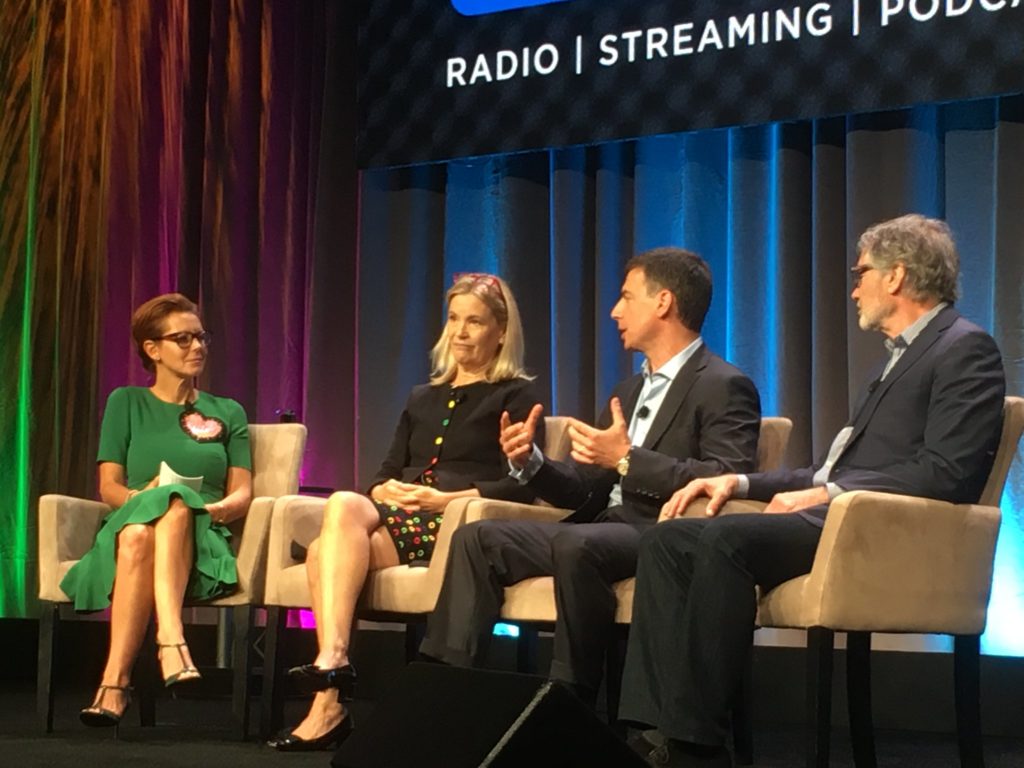
During the past several days, I've heard strong feedback for many of the general sessions/lunches that happened at the Radio Show. The talks by Gary Vaynerchuk and Charlotte Jones Anderson were universally lauded. And even those who attended the Marconi Awards felt more energy, and had great things to say about the hosting of The Bob & Tom Show's Tom Griswold and Kristi Lee.
So far, so good.
Then there was the omnipresent view from the top – radio's leadership being interviewed on the big stage. Stephanie Ruhle of MSNBC returned to the Radio Show to handle the interviewing duties for the second straight year. And this time around, it was Mary Berner, David Field, and Bob Pittman representing radio broadcasting's biggest companies.
There were some quotable “moments” in this session. After all, these are the captains of our industry; the people responsible for navigating the biggest companies in radio through the challenges it faces today and those it will most assuredly encounter down the road.
Love them, despise them, fear them, jealous of them – whatever the case may be – their words and thoughts matter. As we've learned from the fragmented auto industry over the past decade – none of the OEMs are on the same page. And not dis-similarly – radio's honchos often see their worlds differently, too. There is no central voice of American radio – it's every company for itself, leaving organizations like the NAB, RAB, and the scores of state broadcast associations with the not-so-simple task of threading the needle in their quest to get this challenged, storied industry as united as possible.
There were some great lines and observations bandied about in this session, and you can read them in the industry trades or on Twitter. But the one that has truly stirred it up came from Bob Pittman, making an observation about podcasting:
“Podcasting is radio's birthright.”
And with that, any question the radio industry is fully committed to dominating this space disappeared. And as many have noted, iHeart, Entercom, and Cumulus have invested heavily in on-demand audio. Pittman's company bought the Stuff Works podcast franchise for $55 million while his company was still technically in bankruptcy. Entercom has placed its chips on Cadence 13, while Cumulus is committed to podcasting in a big way through Westwood One.
And they're not alone. Commitment to podcasting is taking on many forms throughout medium and smaller broadcast companies, too. There's even Marconi Awards for podcasting, too. As Pittman quipped, “All of us should be doing it.”
That sentiment was echoed by David Field on Variety's “Strictly Business” podcast. As he explained to Todd Spangler, “The podcasting business is exploding, and if you don't create a strong position today, you're lost.”
iHeart announced its second annual Podcast Awards show this coming January in LA. It's another sign his company is going all-out in the podcasting 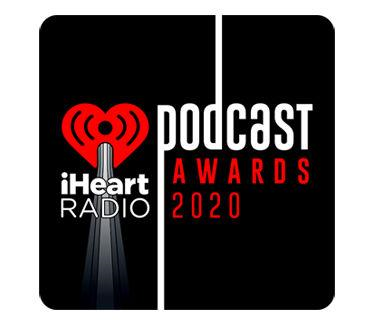 space.
space.
This message has permeated throughout the radio industry. Hubbard's investment in Podcast One is another prime example of how commercial radio broadcasters have committed to podcasting with both financial and human resources. In Canada, Rogers recently purchased branded podcasting leaders Pacific Content. It's happening everywhere.
Of course, public radio – NPR, other networks, and local stations have been at the front lines of podcasting. As radio broadcasters, they've consistently been in the pole position of the space, creating some of the best and most popular podcasts in the ecosystem. If you believe “Serial” was a groundbreaking moment for podcasting, don't forget it was produced five years ago by a public radio entity – “This American Life.” And as outgoing CEO of NPR, Jarl Mohn explained to Steve Goldstein at the NAB is Las Vegas earlier this year, podcasting is a content play “that’s helped us attract a younger and more diverse audience.”
All that said, Pittman birthright statement represented powerful words, perhaps galvanizing other radio broadcasters to step up to the audio on-demand plate.
But in the podcasting community, they were fighting words. Within moments of making his pronouncement, Twitter blew up with vitriol over Pittman's comments about radio's podcasting desires:
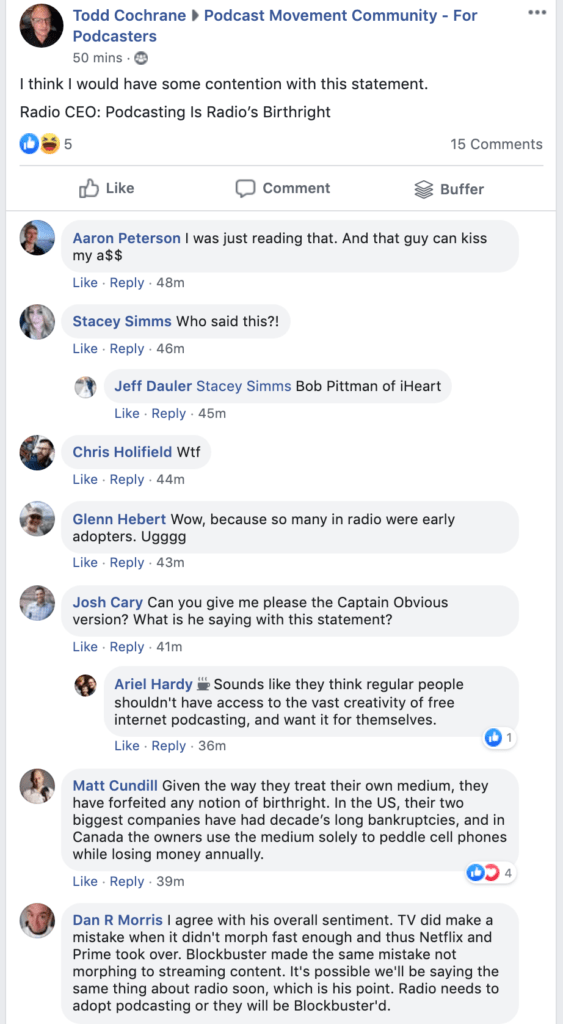
Some have said that Pittman's comments are tantamount to big-footing podcasters. Others have called them inartful or bombastic, but consider the crowd. Pittman was speaking to an audience of radio execs. You'd expect him to offer bullish comments about radio broadcasters' chances to succeed in podcasting. That's his job.
At this summer's Podcast Movement conference in Orlando, radio broadcasters were everywhere – on stage, on the floor, and at social occasions. In fact, they have also become major sponsors of the conference, welcomed by its organizers. My interview with iHeart's new head of podcasting, Conal Byrne, laid out the schematic for how the company will move forward in this fertile space. That may not have made podcasters happy either, but it is the truth.
If there's anyone who understands the tensions between these two communities, it's us. It's why we started “Broadcasters Meet Podcasters” in 2017. The idea then – and now – is to bring together both groups to create better content, grow the space, and expand its revenue base.
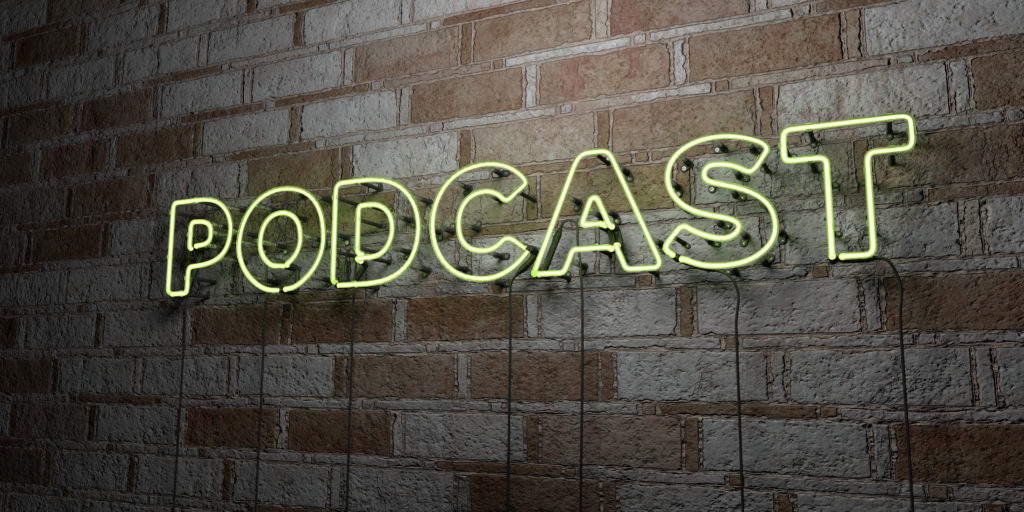 Our “Corner Office” panel last year, featuring Caroline Beasley, Ginny Morris, Suzanne Grimes, and Julie Talbott was moderated by podcasting pro Elsie Escobar. It was a textbook show of mutual respect and a sign that working together is not only attainable, but smart.
Our “Corner Office” panel last year, featuring Caroline Beasley, Ginny Morris, Suzanne Grimes, and Julie Talbott was moderated by podcasting pro Elsie Escobar. It was a textbook show of mutual respect and a sign that working together is not only attainable, but smart.
Thousands of people have worked hard at this craft, investing their resources and their careers in pursuit of producing quality on-demand audio. If podcasting is to emerge as a mainstream media category, they should be rewarded for their work.
The fact is, each group has its assets but also its vulnerabilities and needs. Many podcasters have lacked production and sales expertise, as well as the lack of a “megaphone” to help promote their shows. Radio broadcasters (public radio excepted) have struggled with long-form content, and most are challenged by a lack of experienced staffers and podcasting know-how.
As egalitarian and democratic as the podcasting community would like to think it is, the fact is that just a few producers and personalities at the top of the heap have made the lion's share of the loot. Even the lopsided “80/20 Rule” doesn't apply here. In reality, even fewer have truly cashed in on podcasting's potential.
I would urge podcasters to take a deep breath, and not turn Pittman's comments into a battle cry, a cause célèbre, or a line in the sand. He is a tough 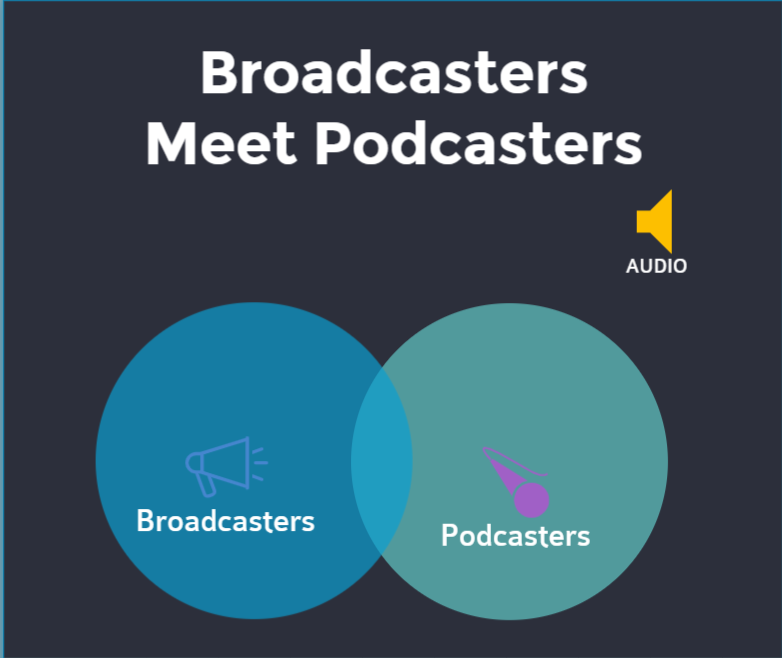 media executive who will fight hard for his company and his industry. Nothing new there.
media executive who will fight hard for his company and his industry. Nothing new there.
And it's not like podcasting doesn't have its share of in-your-face, dynamic media personalities either. There's no lack of dynamic, bombastic characters in the podcasting space. Everyone has an opinion that deserves to be heard.
If you think about podcasting and broadcasting as the two circles in a Venn diagram, there's a lot of common ground in the overlapping space. Focusing on what makes each community strong, smart, and resourceful is a smart strategic course.
It's not a civil war.
It's an opportunity to help vault audio into the primary position in which it belongs.
There's room – and revenue – for everyone.
- The Auto Industry To Radio: Crank It Up! - May 3, 2024
- How Are Your Ratings? - May 2, 2024
- First I Look At The Purse - May 1, 2024





He appears to be a victim of vocabulary.
‘Birthright’ is privilege.
And that simple definition can cause comment to be misconstrued. Especially when it’s just one line—
Hurled into the world of the internet…
Without the necessary context of the words and meaning around it.
I would agree, and hope that I added some context to the “skirmish.” Lots of sensitivities on both sides.
If there was as much interest in listening to podcasts as there is in talking about podcasting, a lot more people would be getting rich from it.And when was the last time some CEO at a conference said something on a panel that actually led to a significant action or initiative anyway?
And then there is radio’s ability/willingness to develop compelling podcasts where its traditional advantages (free and easy) don’t exist. Podcasting is all about content and radio doesn’t, as an industry have a lot of talented spoken word talent, nor does it spend much money of developing talent in general. Do any of those people on that panel see enough potential to be willing to hire, train and develop some? Then develop a business model, marketing and sales efforts to support it?
I wouldn’t worry about Bob Pittman’s proclamation on a panel at a trade convention. But I wish I had a buck for every time someone in radio talked about podcasting’s potential and did nothing to realize it.
I love your opening line. And I think the debate that’s been raging in radio – do we buy or build? – is central to this conversation. As the blog post points out, it’s looking like more and more broadcasters are opening up their checkbooks, perhaps realizing there’s no way they have the horses or the Benjamin’s to create their own podcasting businesses from within. Appreciate you weighing in.
I’ve come to the conclusion that all media will soon be on-demand. It’s certainly becoming rapidly true in television. Podcasting is just the word describing on-demand audio, a likely replacement for radio. Streaming and services like Apple or Amazon music fill the music demand…podcasting will serve the spoken word demand. Radio must realize that we have a promotional and local sales window to launch our versions of on-demand audio that will exist only while we still have an OTA audience.
Jackson, I believe there’s still a market for LIVE media. We have to do a better of prepping, staging, and presenting it. There’s still a new to know what’s happening NOW, but it will take more work and resources relevant. That said, there’s no denying the growing power of on-demand. Thanks for the comment.
Radio’s involvement may help more people discover podcasting, which will help independents, too. But if podcasts from the radio industry get trapped in the radio paradigm, especially when it comes to bloated commercial inventory, there’s a risk podcasting will lose its unique perception as an alternative to radio, which could slow further adoption.
Radio’s performing rights arrangements give it an edge in presenting music, and its better for news because it is (or can be) live. Podcasting is superior for niche and long-form spoken word content. I’m not sure there’s really much overlap, let alone a “birthright.”
Paul, it’s a different medium, to be sure – despite being in the “audio” family. I believe the key to not getting caught up in the “radio paradigm” is to do exactly what companies like iHeart, Entercom, and others are doing. Buy a great podcasting company and let them do their jobs. Appreciate the comment.
The problem I have with conglomerate media jumping in the podcasting pool is much like when they take over terrestrial markets, Put out the biggest ripple that attracts everyone else (ad dollars) forcing other broadcasters (podcasters) to disappear. They should stick to their side of the communication spectrum and leave true creative podcasting to those that offer cool and eclectic niche podcasts that reaches millions and let the conglomerates stick to their streams of their broadcast. You don’t get an award from iHeart for being a joe blow podcaster unless iHeart has it’s fingers all up in that pie.
Such is the way of the media/entertainment world, David – much of it is dominated by the biggest players. But that’s not just radio – it’s film, on-demand video, television, book publishing. The good news is that podcasters will continue to do what they love. The bad news is that most won’t make much money directly from that content. Thanks for the comment.